Oct 29, 2024, Day 2 in Bhutan: Visiting Nabji Chiwog, Rice Harvesting, Meeting with Zhemgang Governor
Hello. Today is the second day of our visit to Bhutan.
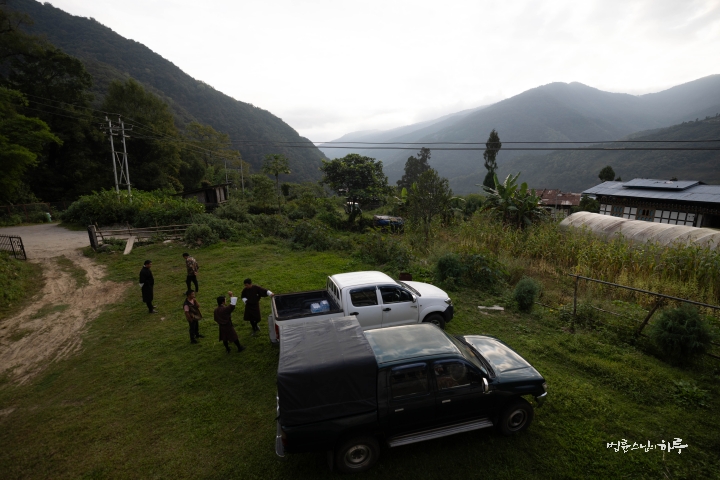
After completing his morning practice and meditation, Sunim had breakfast.
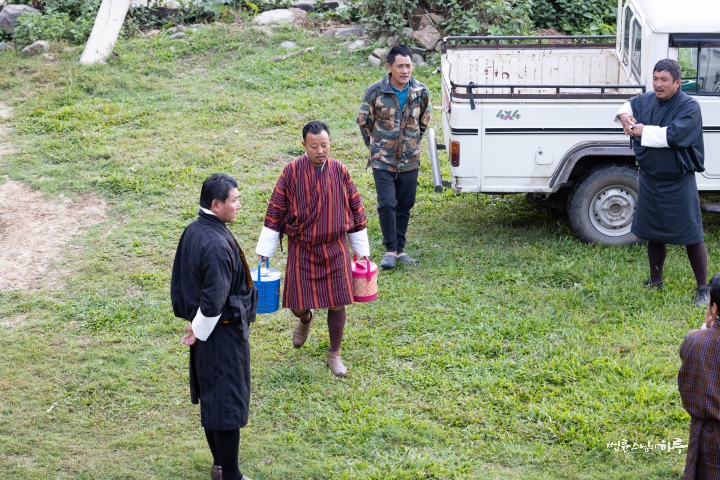
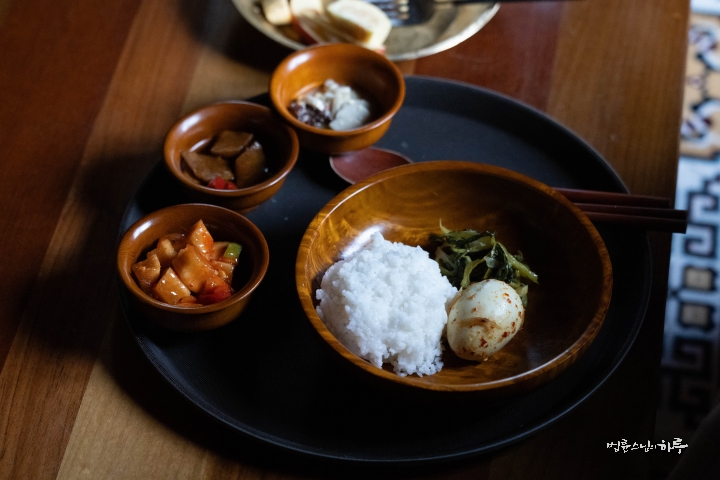
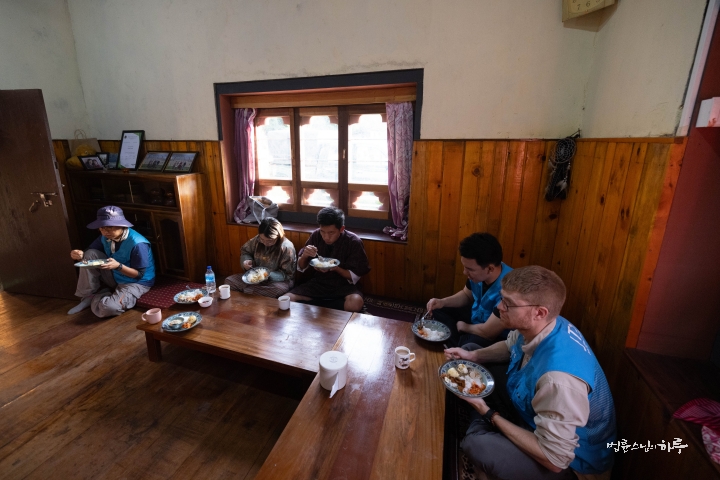
After eating with gratitude, Sunim took a commemorative photo with the host couple of the lodging.
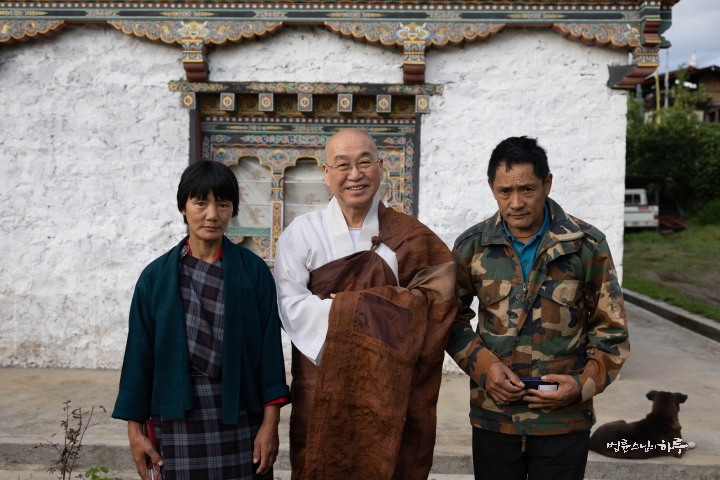
“I had a good night’s stay.”
After finishing the meal, the visit to Nabji Chiwog began at 7 a.m.
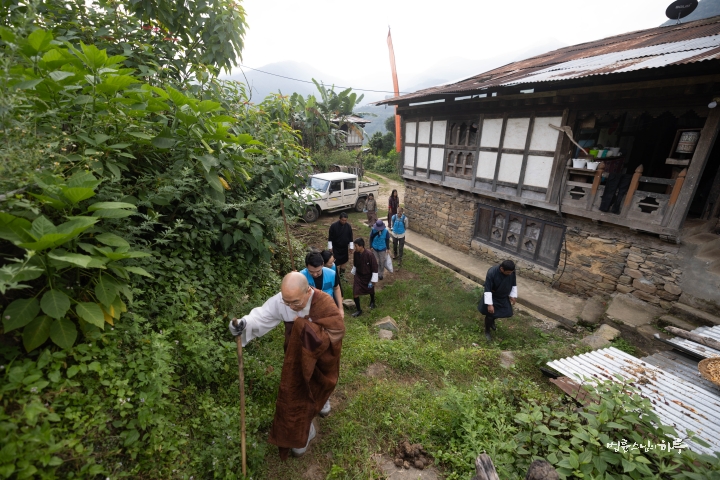
After walking a short distance from the lodging, a golden field appeared.
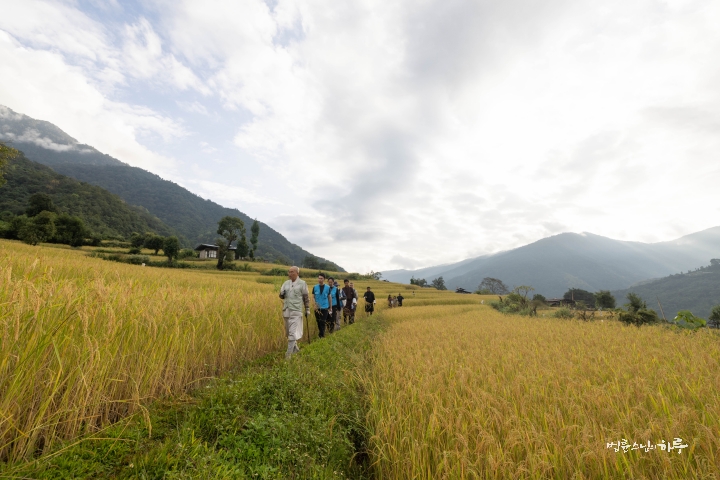
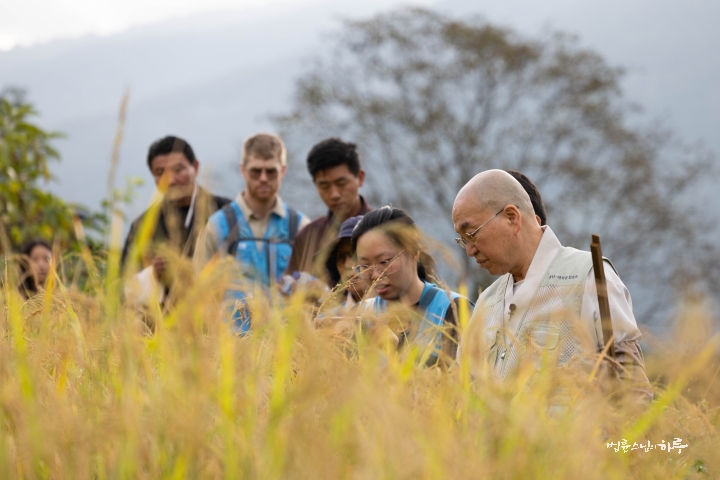
“The rice plants are incredibly tall. In Korea, they’re only about half this height. If they’re this tall, they’d all fall over in a storm. In Korea, we’ve improved the seeds to make them much shorter. Taller plants are good for using the rice straw, but these days we don’t use rice straw much.”
Hearing Sunim’s words, the Tshogpa of Nabji Chiwog smiled and replied.
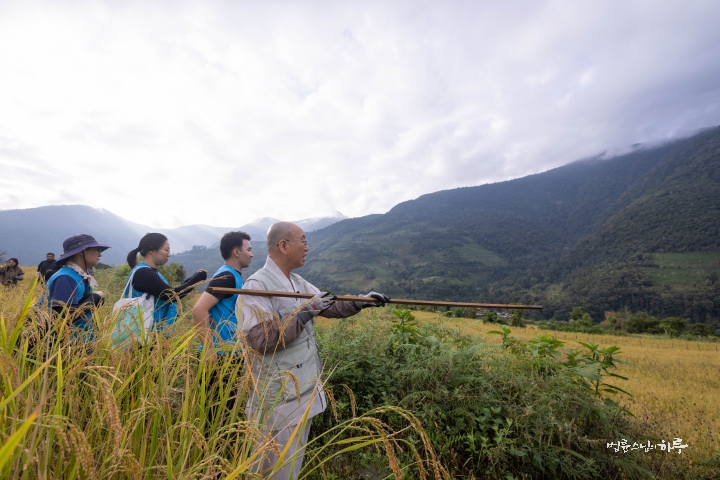
“Thanks to the irrigation channel you helped us build, our harvest this year is likely to double.”
After passing through the golden fields, we came across empty paddy fields where residents were not farming. The owner of the land had grown too old to continue farming, and suggested that Sunim could make use of this land. The villagers had tried to reclaim it, but there were too many stones, making it difficult. Fortunately, the government office said they would provide an excavator this year, making reclamation possible.
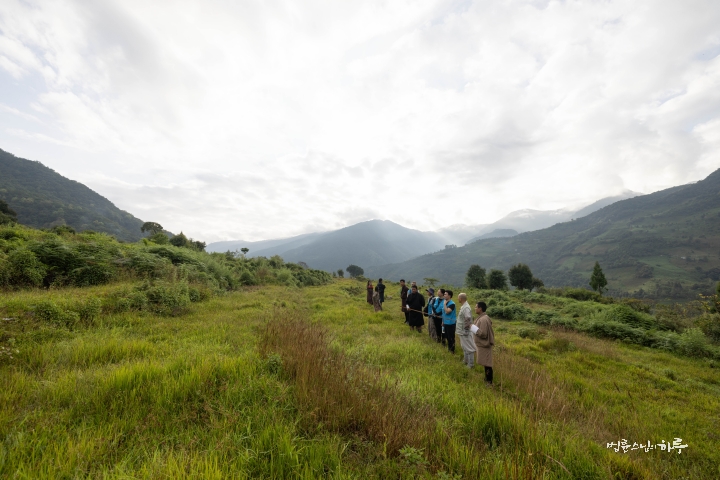
After looking around the empty fields, Sunim spoke.
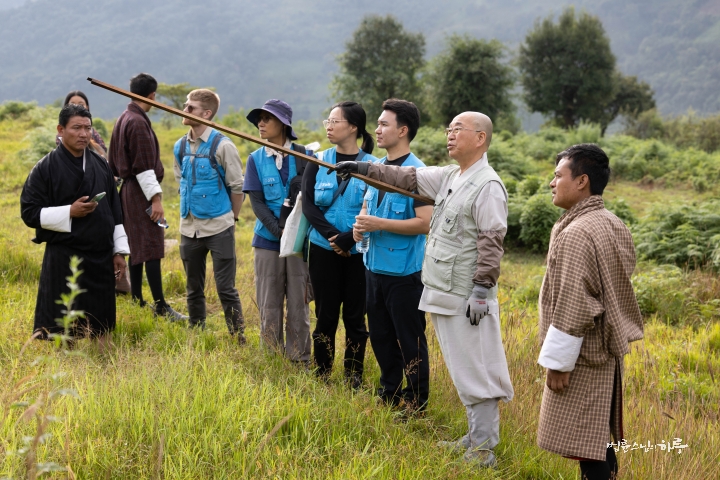
“This land might be good for an orchard. Because it’s long and sloped, it would be difficult to irrigate if used as a paddy field. If it’s to be used as a paddy field, we’d need to divide it into smaller sections. How much unused land is there that’s not being used for rice farming?”
“About 30 acres in total.”
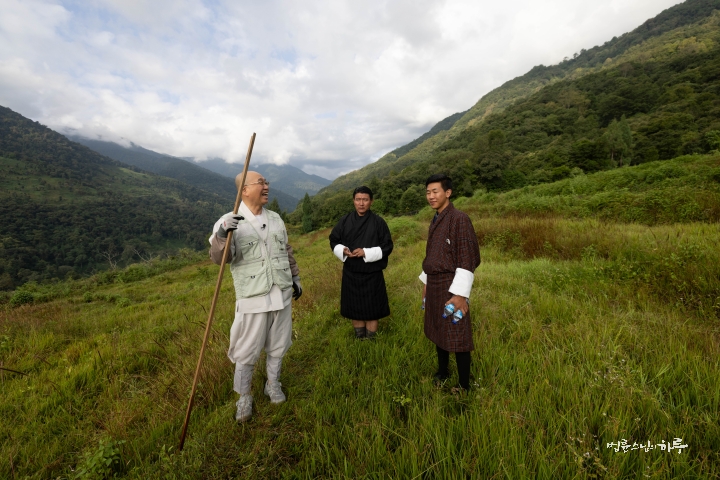
“That’s about 36,000 pyeong. Reclaiming it would be no small task, especially removing all the stones. If you dig with an excavator, you’ll find an enormous amount of stones. It might be better to turn it into a field for fruit cultivation.”
After examining the empty fields, we headed to an area where new road construction had been done in the village.
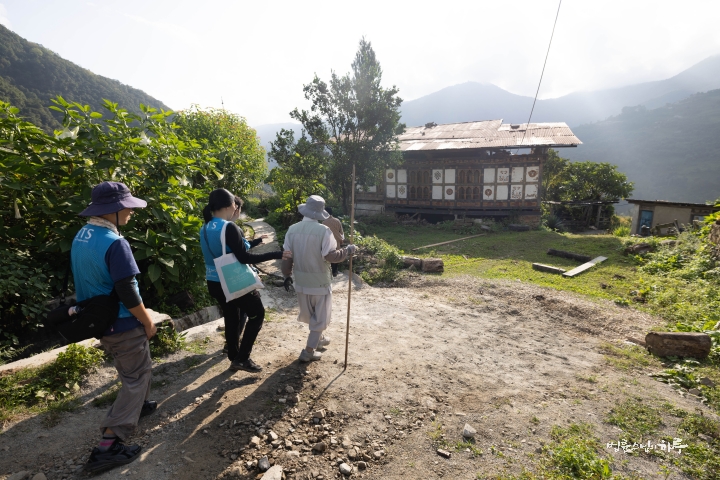
A narrow road had been neatly constructed with cement. The Tshogpa (village leader) had applied to JTS for a pilot project, and the villagers had worked together to build the road.
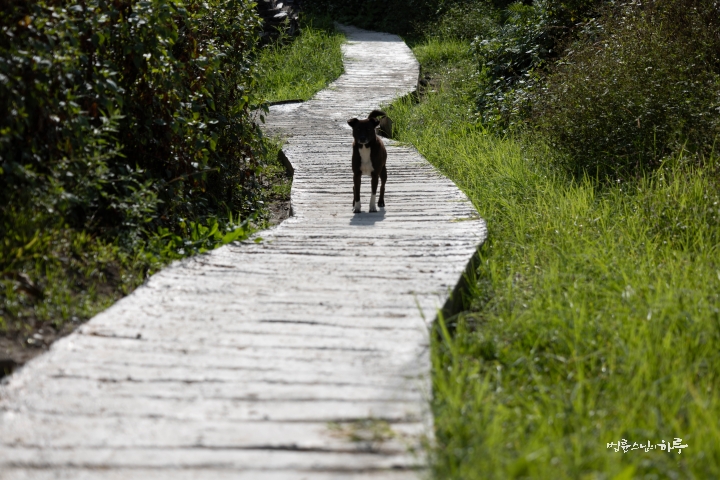
The Tshogpa showed Sunim the road and made another request.
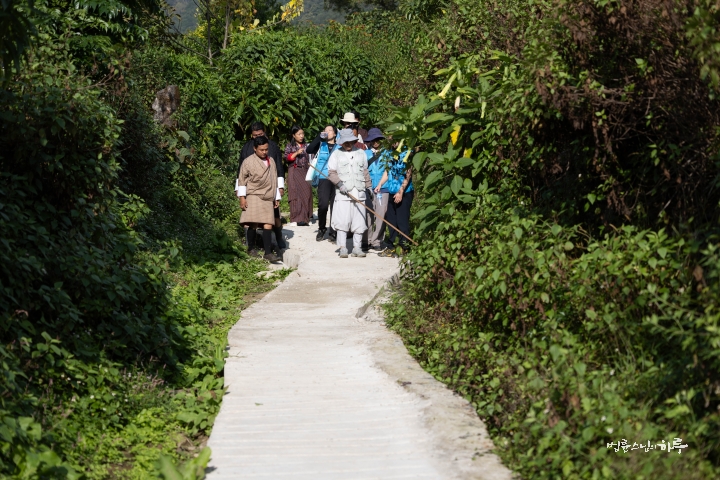
“The width is 1 meter, which is too narrow for the rear wheels of a cultivator to pass. We’d like to widen it to 1.5 meters.”
Sunim smiled and said.
“When you first requested it, you said it was a path for people to walk on, so I told you to make it 1 meter wide. If you had told me it was for cultivators, I would have said to make it 1.5 meters from the start. I asked several times if it was for machines…”
The Tshogpa explained the reason.
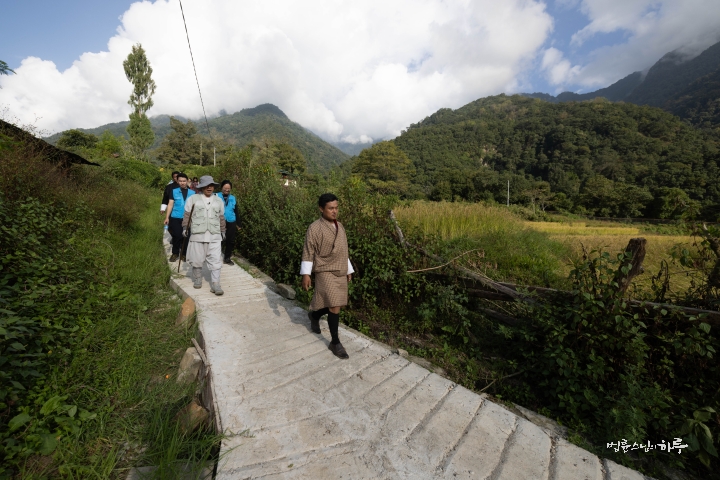
“We were worried that if we asked for 1.5 meters from the beginning, you might not grant our request. We were concerned about appearing too greedy.”
Sunim smiled and said.
“I’m suggesting making the road suitable for machines. If I’m willing to build a road where there isn’t one, why wouldn’t I agree to pave an existing road?” (laughs)
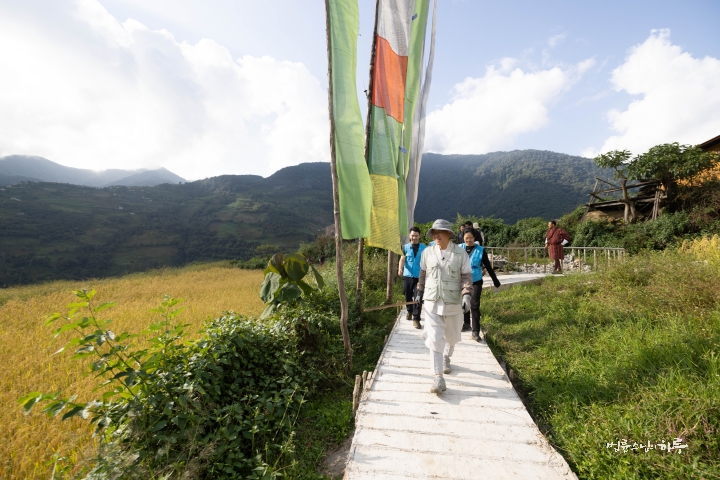
After agreeing to additional construction to widen the road to 1.5 meters, we headed to the temple in Nabji Chiwog.
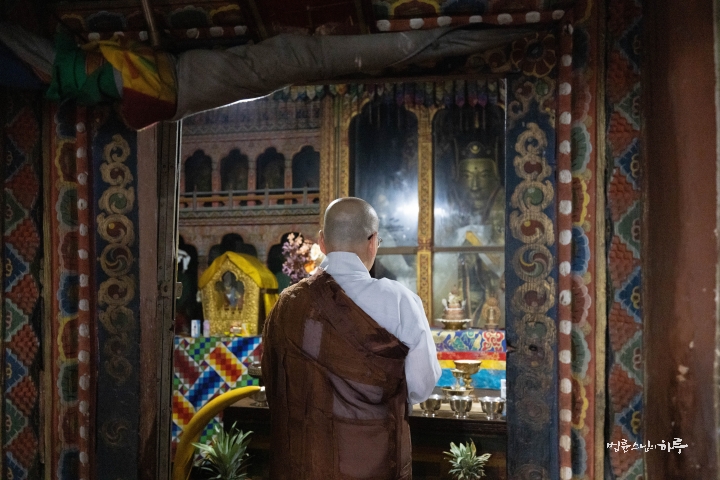
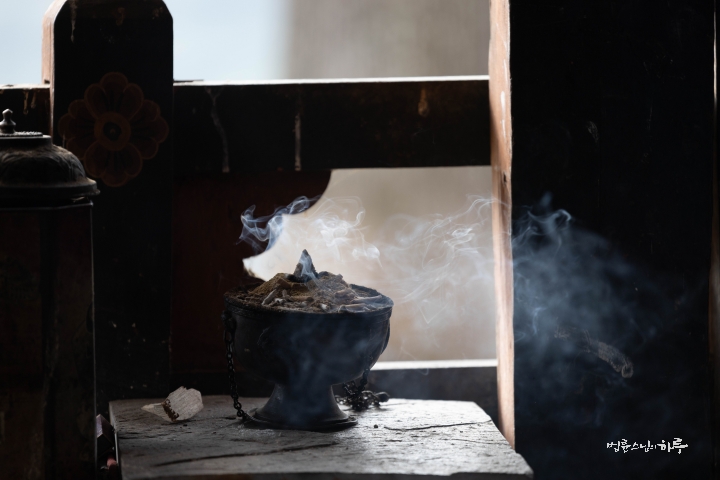
After paying respects at the temple, we examined the area in front of the temple where the Nabji Tshogpa had requested repairs.
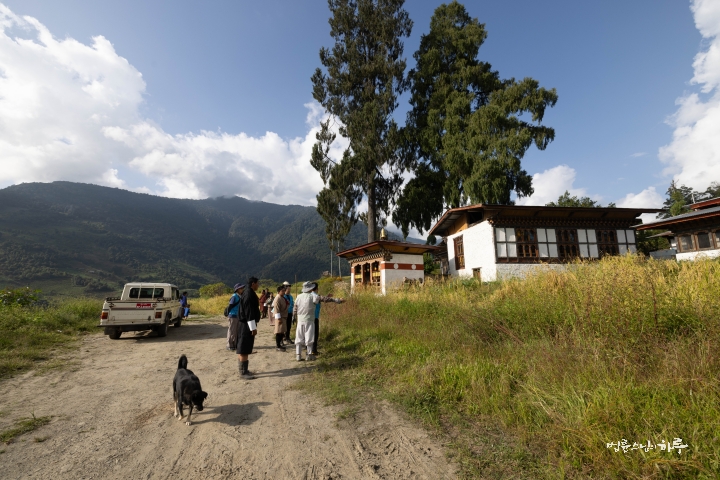
“We’d like to pave the entire area in front of the temple with cement. Many pilgrims visit, and parking is very inconvenient. There’s also a lot of dust.”
Sunim replied.
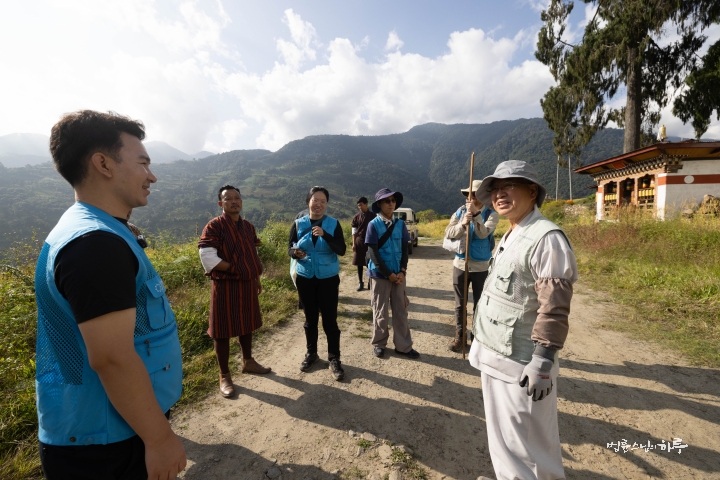
“Since this is in front of the temple, paving it with cement wouldn’t look good aesthetically. For a parking lot, it’s better to use a mixture of soil and gravel. Because this is a temple with a long history, it’s necessary to preserve it in its natural state. If you raise the ground level by adding more soil or gravel, water will drain naturally. In South Korea, they’re removing cement paving from old temples. It’s to show the natural state. First, it’s necessary to make a comprehensive plan for how to develop the temple.”
As the Tshogpa was very eager to pave the area in front of the temple with cement, we decided to discuss it again in the afternoon. We then went into the paddy field in front of the temple to help with the harvest.
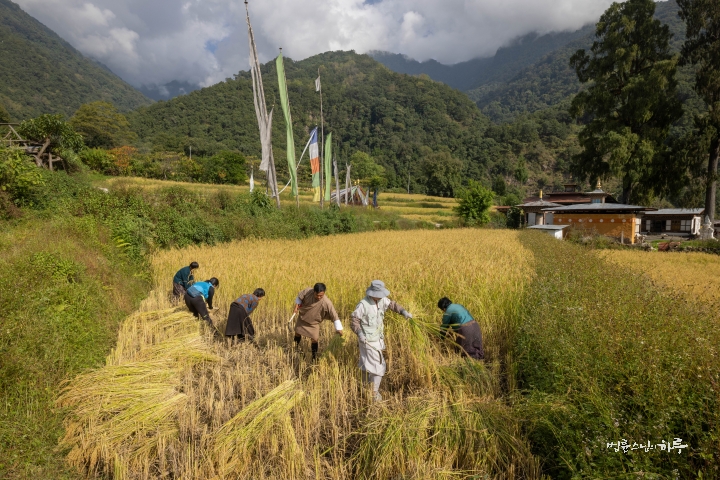
“When cutting the rice, do you cut at the base or in the middle?”
“It’s fine to cut in the middle.”
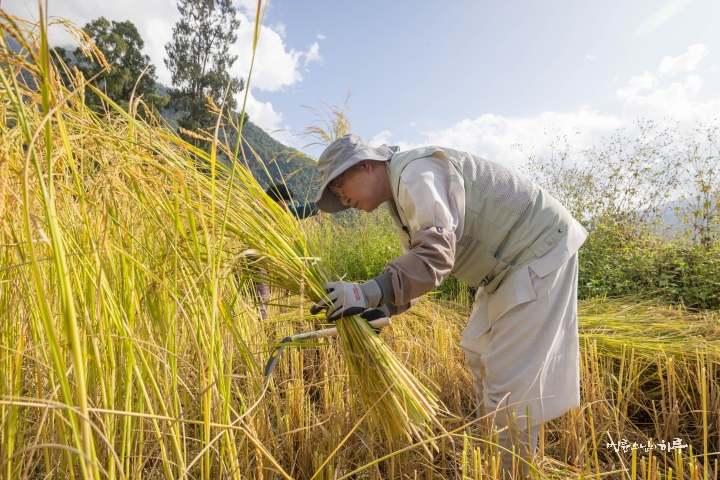
The rice plants were indeed very tall. As Sunim started cutting the rice with a sickle, villagers, central government officials, Gup, Mangmi, Tshogpa, and JTS volunteers all joined in cutting the rice.
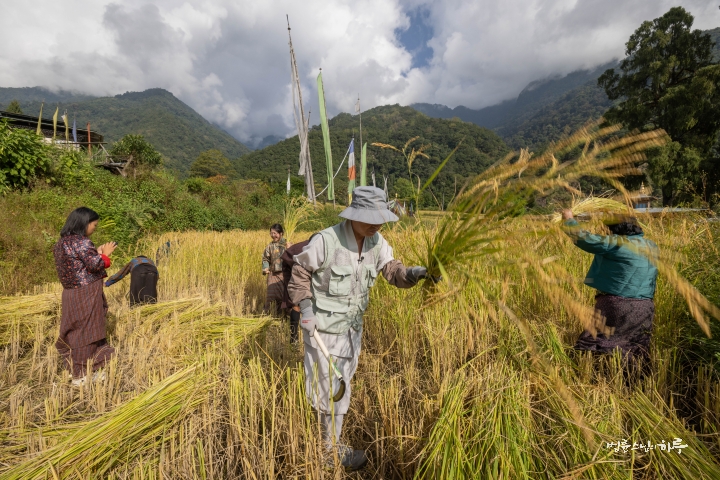
Sunim asked Ms. Yeshi, a central government official:
“Ms. Yeshi, have you ever cut rice before?”
“This is my first time using a sickle.”
“This is how we learn, one step at a time.”
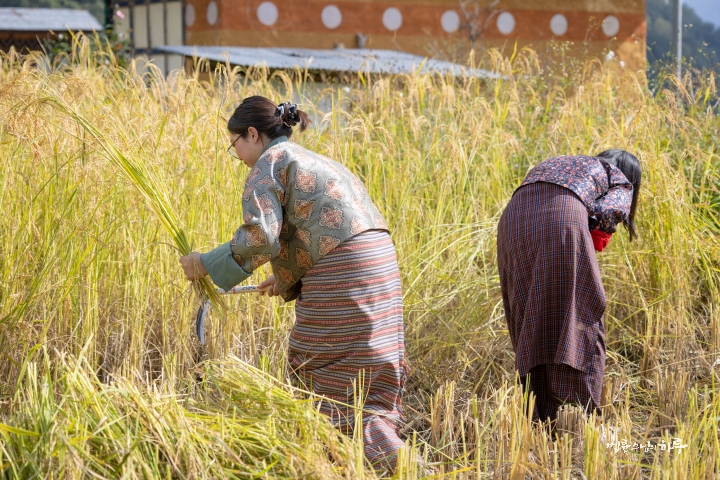
While cutting the rice, Sunim asked the residents various questions.
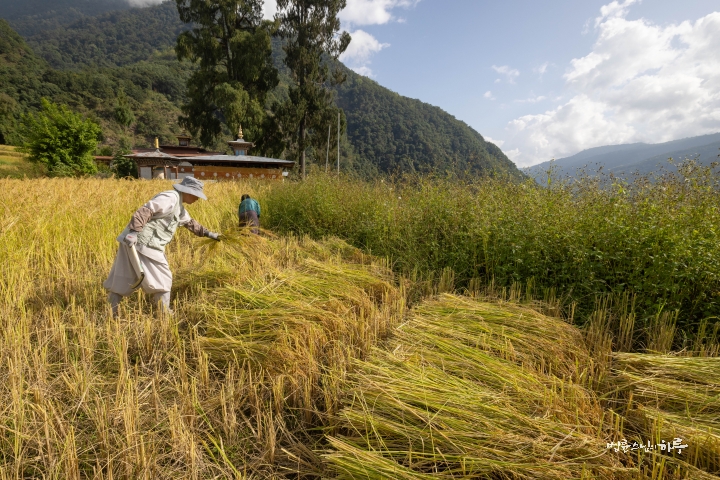
“How do you thresh the rice? Do you use machines?”
“We don’t have machines. We hold the rice stalks and beat them against stones.”
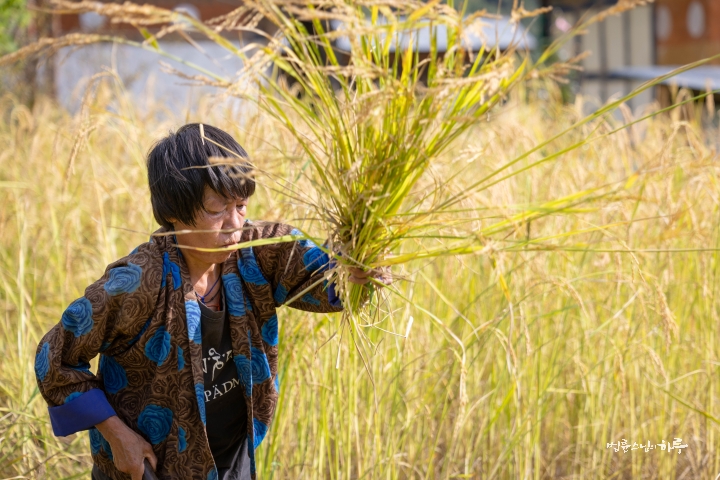
“In South Korea, even before combine harvesters were developed, we had threshing machines that separated the grains by pedaling. Beating against stones doesn’t remove the grains very well. Also, if you plant the rice in straight lines, you can harvest several stalks at once, which makes harvesting faster. When it’s planted haphazardly like this, it’s not easy to cut the rice.”
Cutting the rice in the middle made it difficult to gather neatly. However, it was easier in some ways as it didn’t require bending over as much.
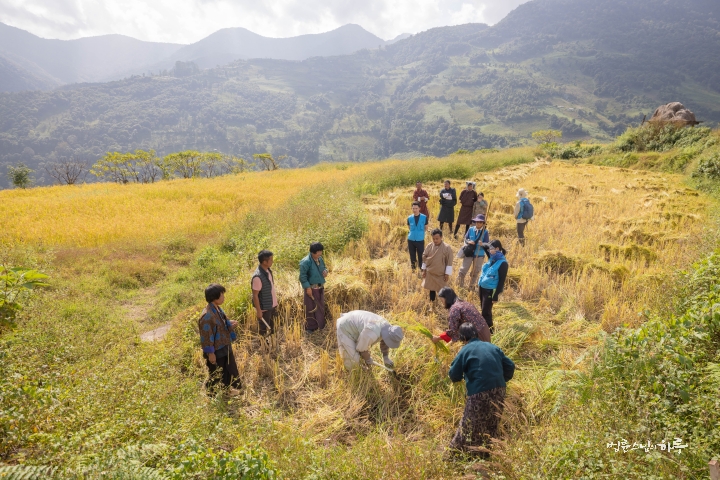
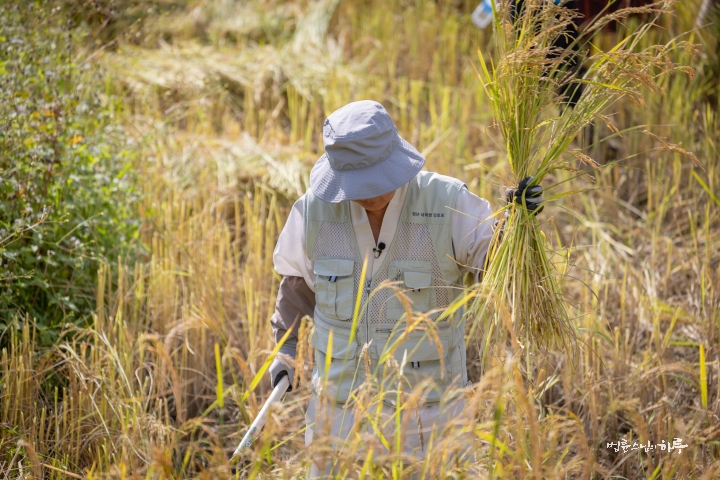
The sound of sickles cutting rice echoed quietly through the mountains for an hour. After all the rice was cut, beads of sweat formed on Sunim’s forehead.
“Good job, everyone!”
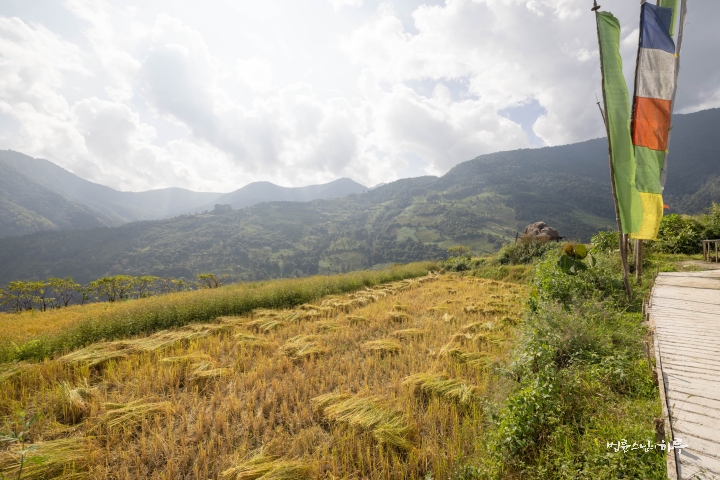
After leaving the rice field, Sunim wiped his sweat with a towel and resumed the inspection.
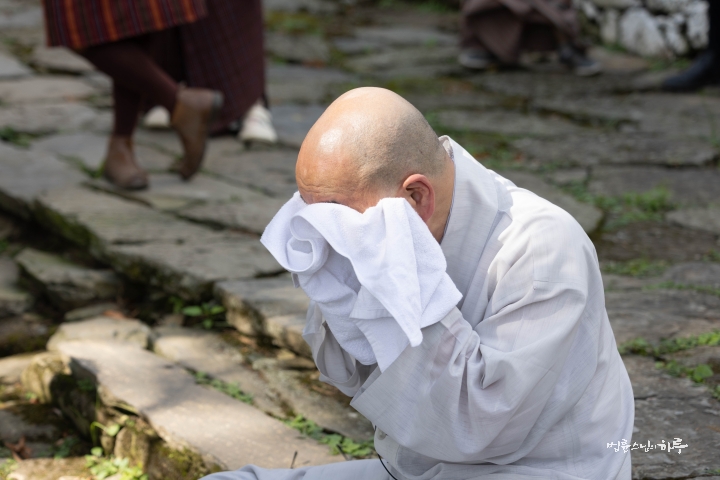
Instead of taking the road, he went down the rice field embankment to examine if a grid-like farm road could be constructed.
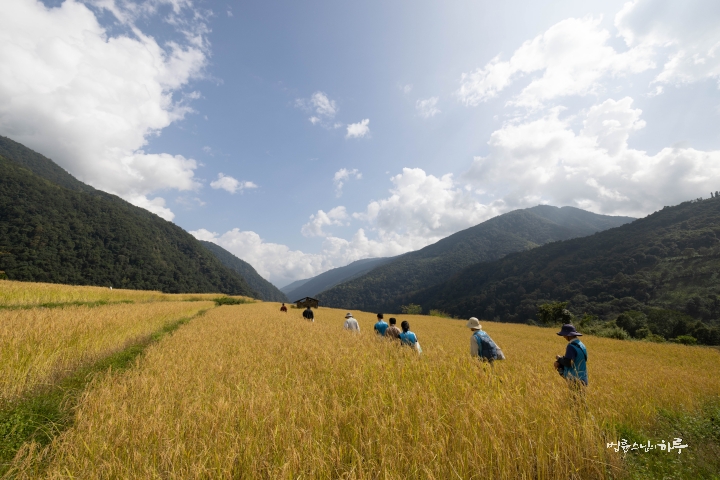
The entire area consisted of terraced rice fields, and the space between the fields seemed too narrow to easily construct new farm roads. After completing the inspection, it was decided to discuss the matter further.
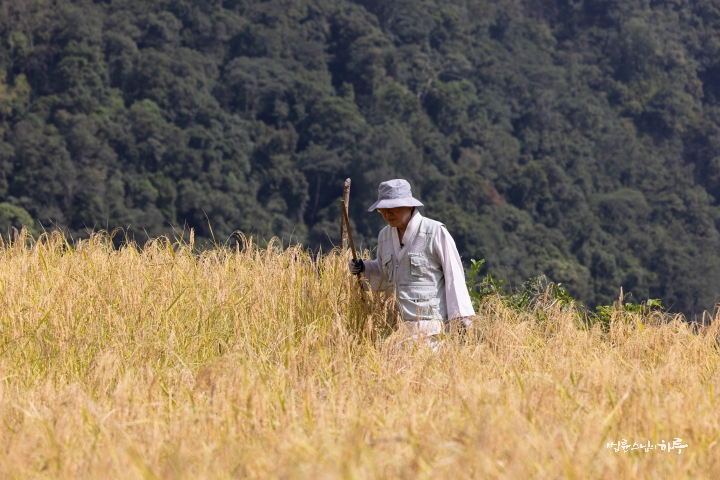
“After inspecting the area directly, it seems difficult to construct a grid-like farm road for now. Let’s conduct further inspections and then decide on the method of building a road that encircles the entire rice field area.”
Finally, Sunim inspected the rice field where rice had been planted in rows in the Korean style. Although he could have gone by car, he chose to walk along the rice field embankment, just as the villagers do.
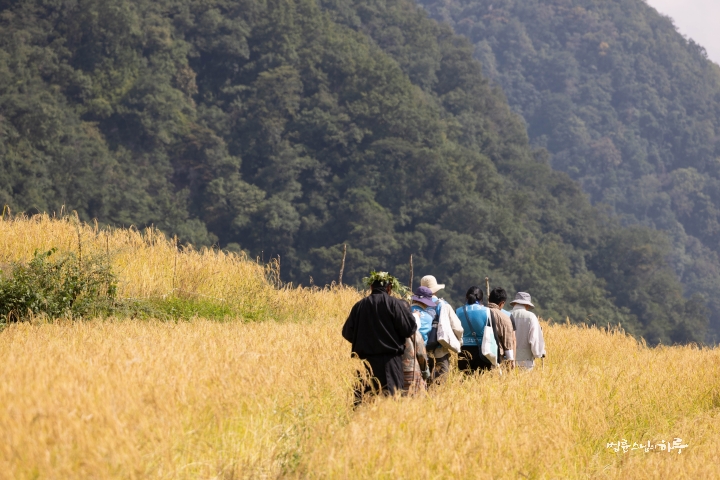
Last April, an agricultural expert from South Korea visited and advised that planting in rows would increase yield, so they experimentally planted one field in rows. Sunim asked Chokba.
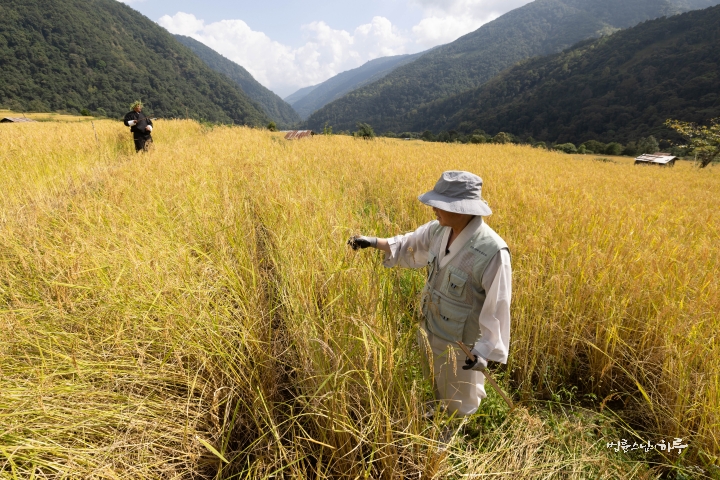
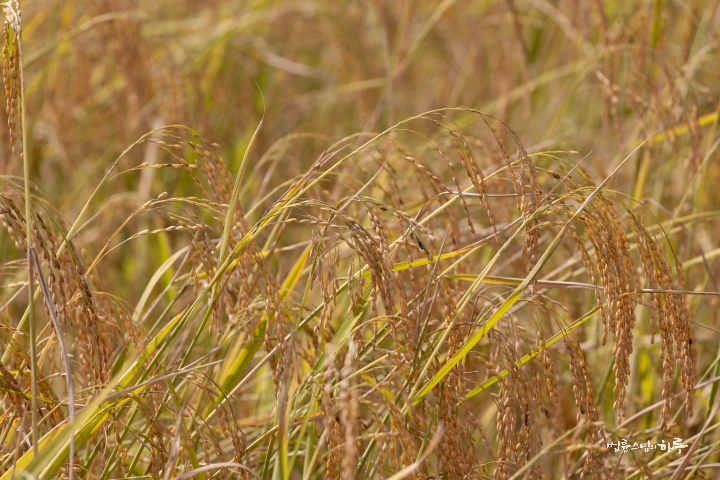
“Has the yield increased by planting in rows? Please compare the right and left sides.”
“The rice planted in rows grew better initially after transplanting, but by harvest time, there wasn’t much difference.”
It seemed that whether planted in rows or not, there was little difference, possibly due to the tall variety of rice. After taking photos for comparison, Sunim went outside the field’s fence.
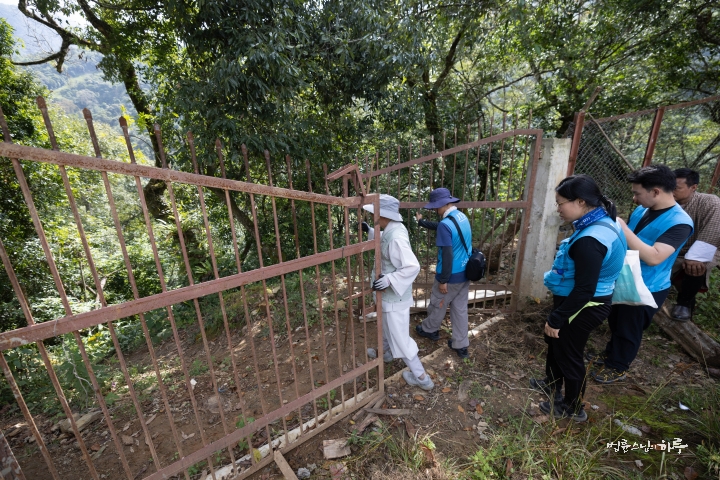
Chokba requested a road be built around the entire outside of the field’s fence. He explained that it was difficult for people to go to work and transport the harvest along the narrow embankments of the field, which extends from the top to the bottom of the hill.
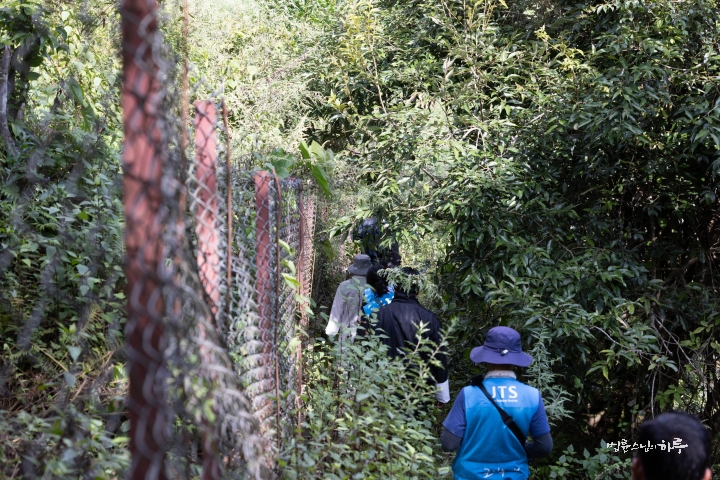
“It would be great if you could build a road around the field to make it easier to transport the harvest. Since it’s difficult to ask people for land inside the field, we’d like to build the road outside the fence.”
Upon going outside the field’s fence, it was found to be a very steep cliff.
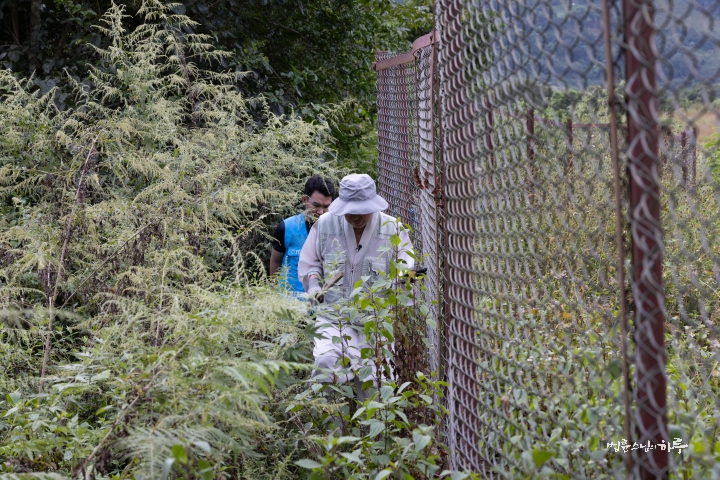
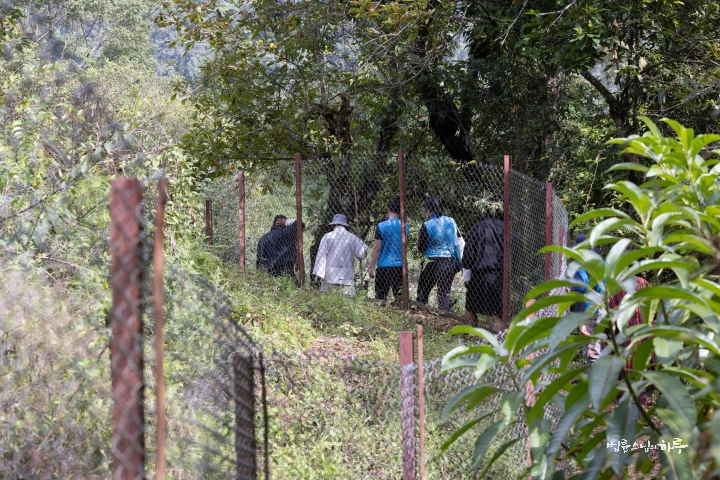
“There’s suitable land for road construction inside the fence, so why are you asking to build a road on this rugged terrain outside the fence? There’s no flat land outside the fence. We’d have to build an enormous retaining wall. Building a road here would be a very expensive project.”
The entire area outside the fence surrounding the field was inspected. It seemed nearly impossible to build a road outside the fence, and even inside the fence, the slope made road construction challenging.
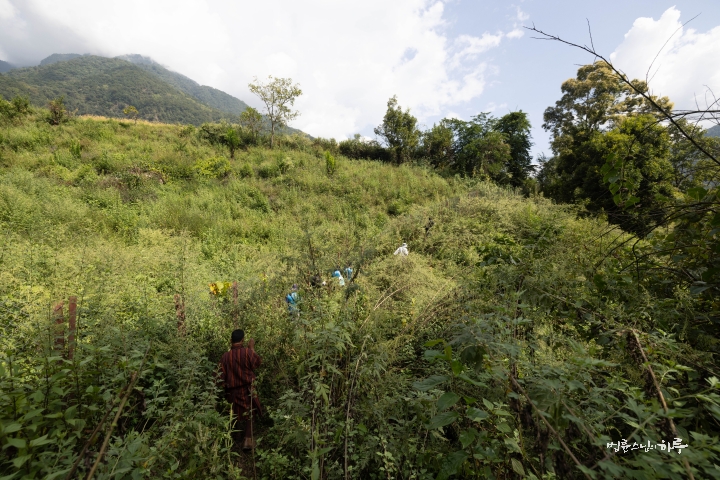
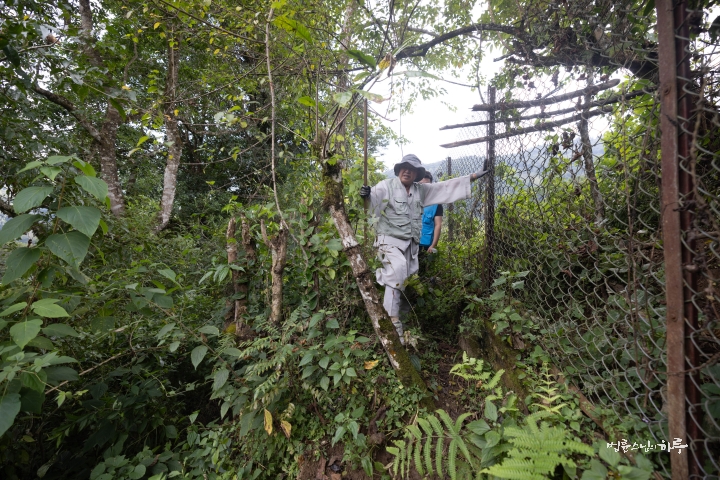
“Building a road on this cliff is a project for the government. It’s not something JTS can do. This is why we need to come and see for ourselves.” (laughs)
After more than two hours of inspecting the steep terrain, Sunim was drenched in sweat. Despite his knee pain, he completed the inspection without complaint.
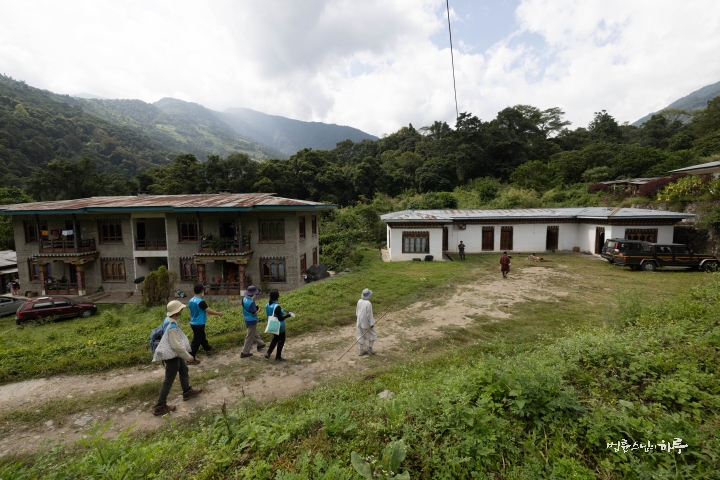
At 11:45 AM, the group arrived at the Kolpu Gyeok office. After a brief rest to recover from the sweat-inducing inspection, lunch was served at 12:30 PM, prepared by Kolpu Gyeok.
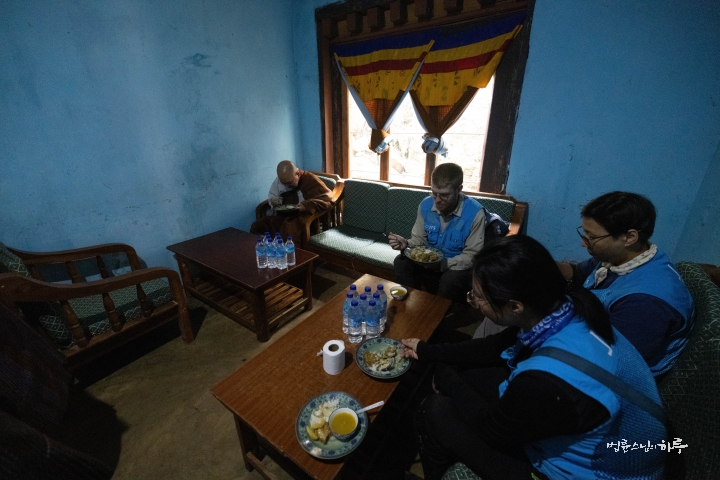
After lunch, at 1 PM, a meeting was held at the Kolpu Gyeok office with Geop, Meongmi, and Chokba present, based on the morning’s inspection. The first topic of discussion was the issue of constructing farm roads.
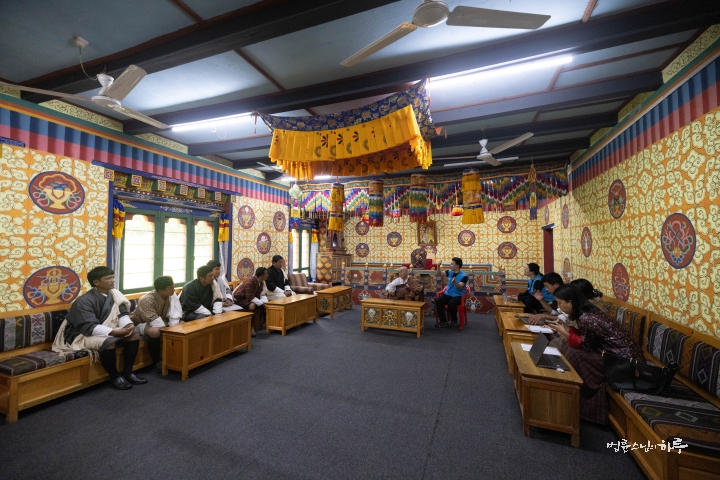
Sunim provided a detailed explanation using Google Maps on a laptop.
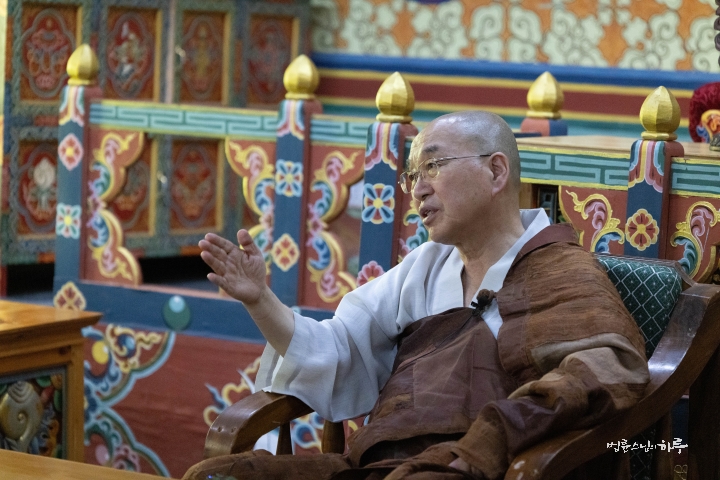
“After the inspection, we found that building a road around the outside of the fence is a large-scale project that would take several months. This is not something that residents can collaborate on. It needs to be entrusted to professionals. So, what we can do immediately is to build farm roads vertically in a straight line. If we follow the existing waterways, it won’t encroach on the rice fields too much. To do this, we need to demolish the existing waterways and build new farm roads and waterways together.
Residents will need to give up part of their fields, and there are three main ways to compensate them. First, it’s best if the landowners agree to build the road. If that’s difficult, second, half could be provided by the landowner, and the other half could be compensated by villagers contributing small amounts. Third, all landowners could contribute equally to provide compensation. Of course, we also need to build several horizontal farm roads, but that seems difficult at present as residents would need to give up a lot of their land.
There are three main issues. First, will the residents agree to give up their land? Second, we need to check if it’s technically feasible. Third, we need to determine the budget. We can only start once these points have been checked. I’m not opposing your proposal. I’m trying to find a better solution.”
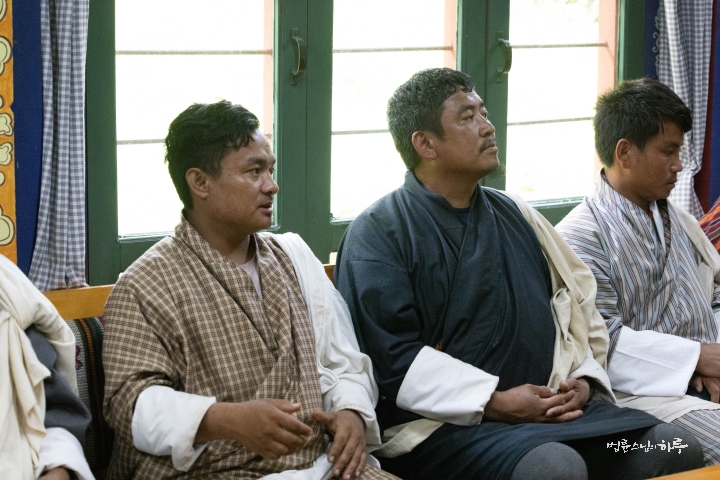
Sunim drew a map on paper and explained again how to build the farm road in a way that was easy for the officials to understand.
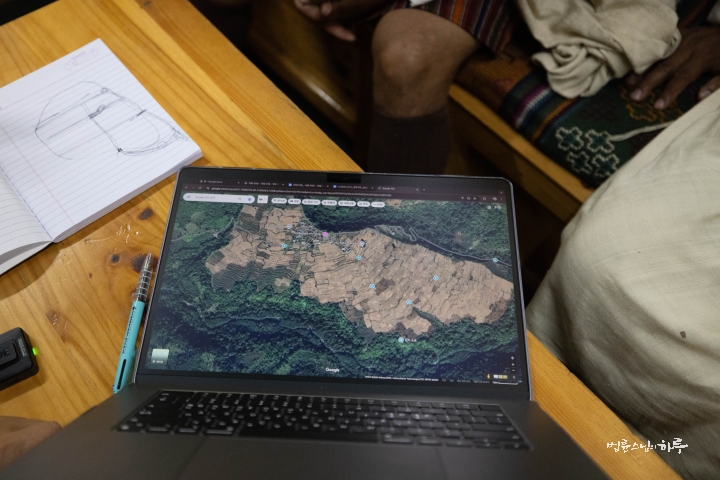
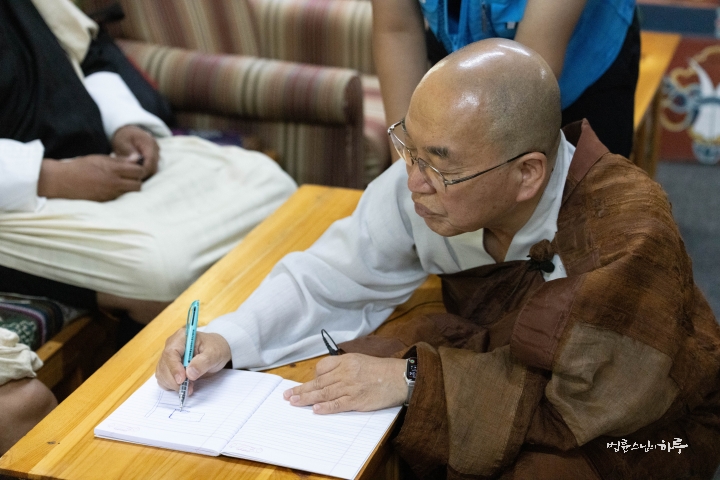
“Since we need to discuss this thoroughly with the residents, I’ll visit again at the end of December. Let’s gather all the residents and talk about it then.”
Chokba wanted to immediately proceed with building a parking lot and road in front of the temple. However, developing the area around the temple requires a comprehensive plan and the consent of the residents, so it was decided to discuss it during the next visit.
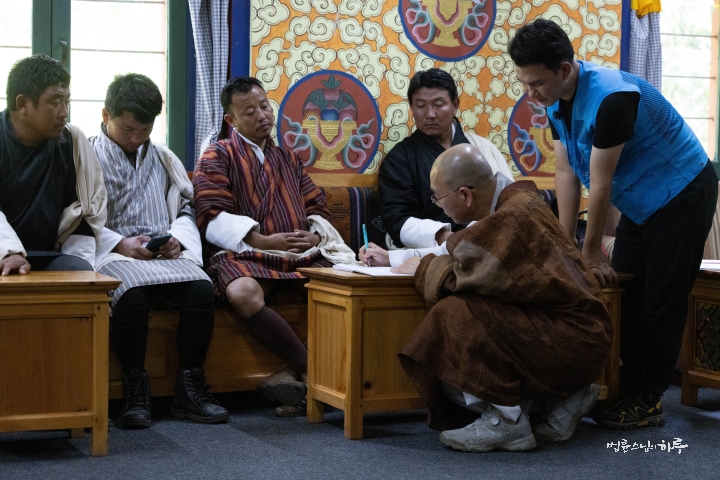
All the residents were busy harvesting, so it was impossible for everyone to gather. Although Chokba was disappointed, it was finally decided to immediately proceed with repairing the reservoir, connecting the unfinished parts of the irrigation canal, and widening the narrow village road to allow cars to pass. The rest would be discussed during the next visit, and the meeting was concluded.
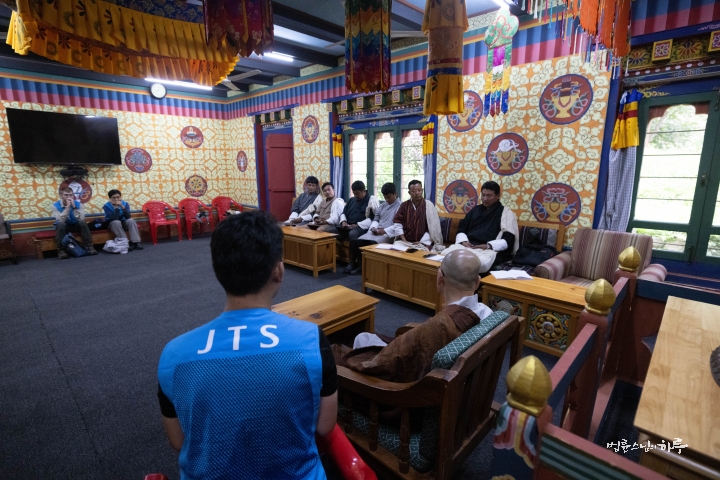
After the meeting, Sunim presented gifts he had brought from South Korea to Chokba. He gave a lightweight sickle that Chokba had praised, and a hearing aid for a deaf villager to try as a demonstration.
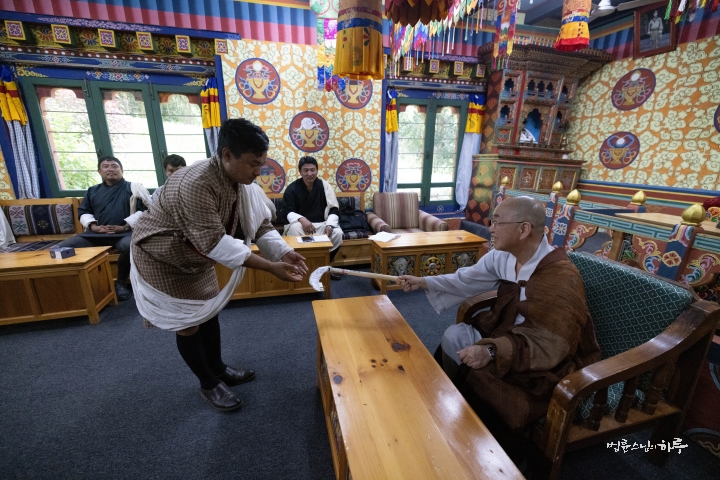
They came out of the office and took a commemorative photo together.
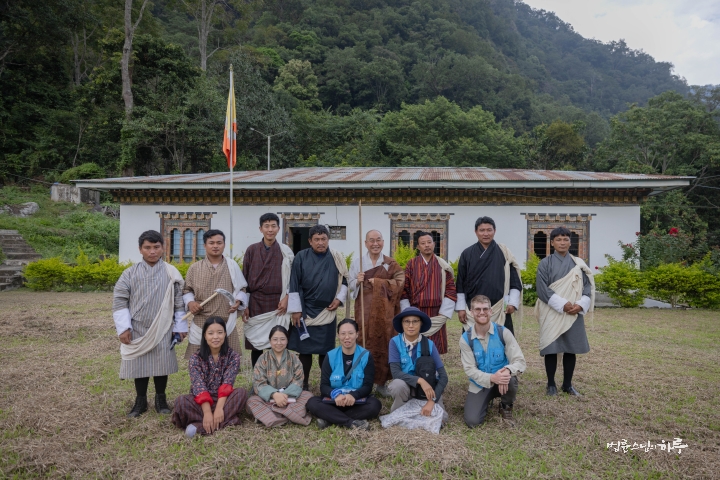
Promising to visit again, they exchanged farewells and at 2:40 PM, got in the car and headed towards Phangkhar Gewog.
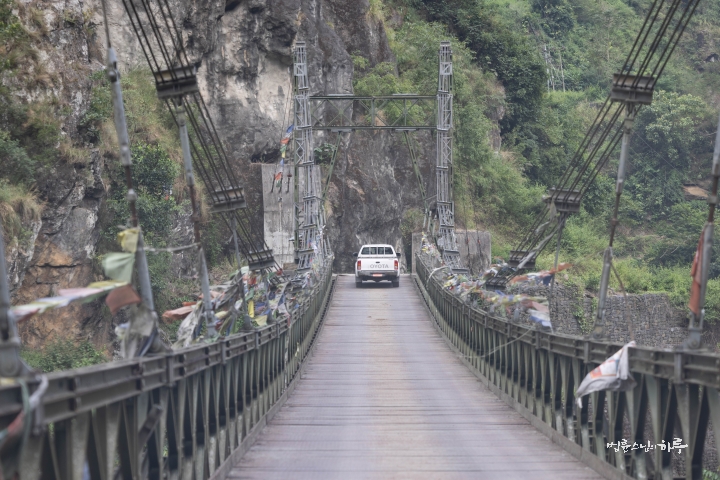
In the first half of the year, a JTS volunteer lived in an empty house in Langdurbi Chiwog, but it was a very remote mountain village with inconvenient transportation. In the second half, they rented a house next to the Phangkhar Gewog office on a main road and set up a temporary office.
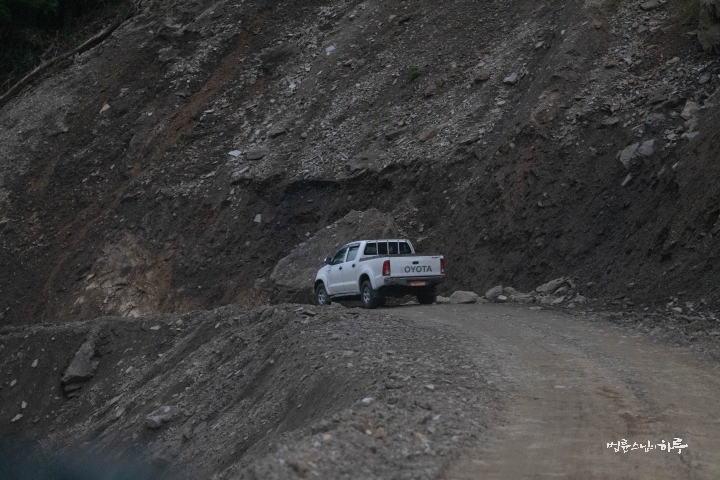
After driving for 3 hours and 20 minutes on mountain roads, they arrived at the Phangkhar Gewog office at 6 PM. The sun had set during the journey.
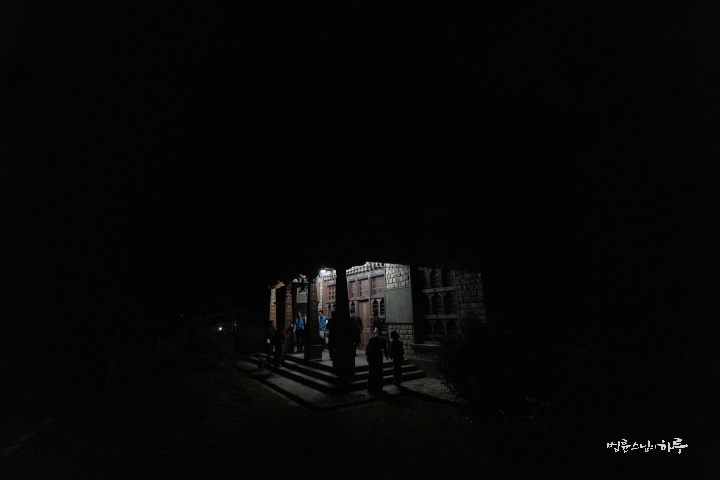
As Sunim got out of the car, the Zhemgang governor warmly welcomed him.
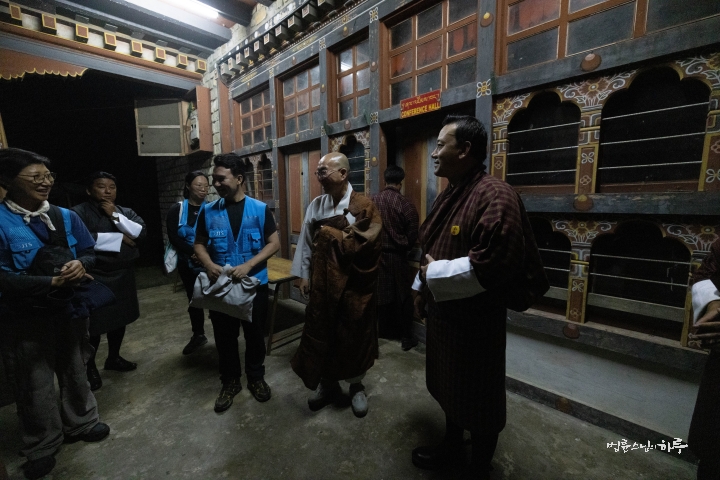
“I’m a bit late because I was surveying the area in Nabji Chiwog where residents asked for a farm road to be built. The residents said it would only take a few days of construction, but when I surveyed the site, I found it was a large-scale project that would take several months.”
After exchanging greetings, a meeting was held at the Phangkhar Gewog office from 6 PM, attended by the Zhemgang governor and Bhutanese government officials.
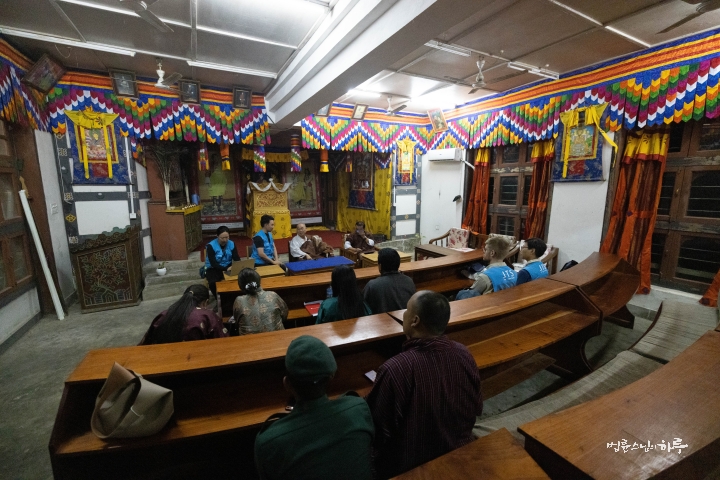
First, Sunim shared the details of his field investigation of Nabji Chiwog, then discussed the next visit schedule for December with the Zhemgang governor. A Zhemgang official reported a schedule for Sunim to visit all the Chiwogs in Zhemgang from December 25 to January 7.
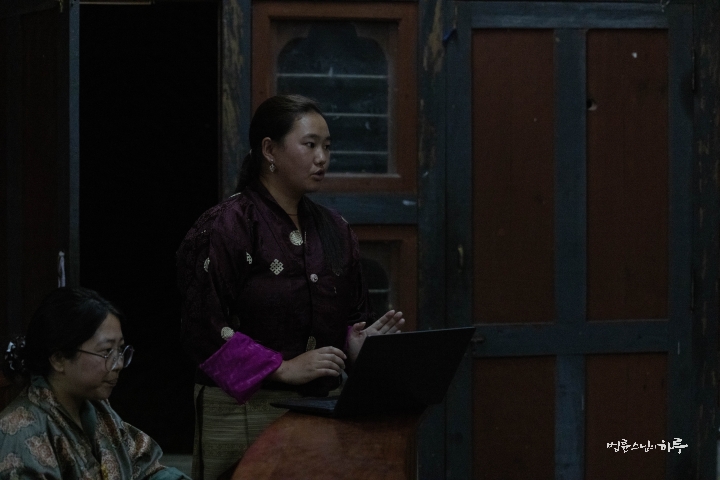
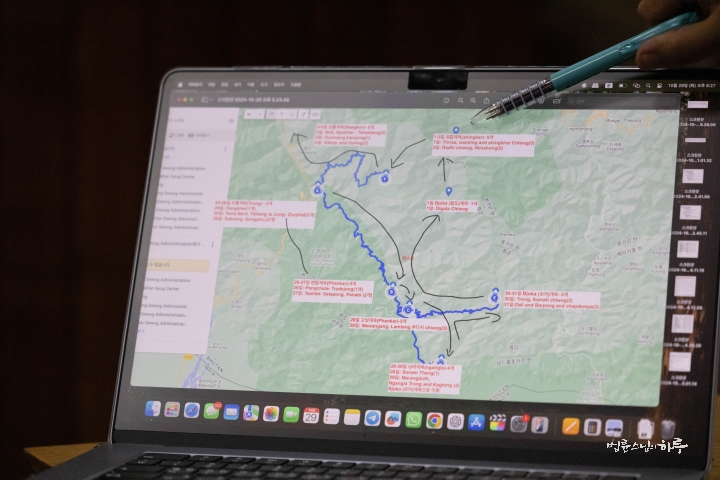
After hearing the report, Sunim spoke.
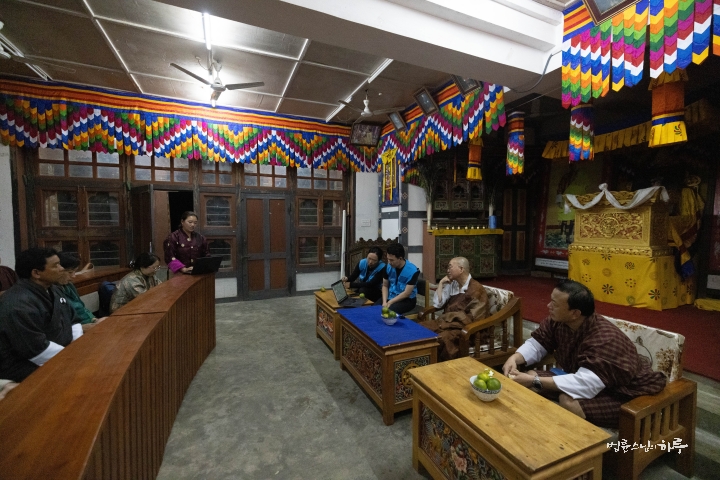
“Don’t worry about accommodation at all. I’ll bring a sleeping bag and just sleep in the villages we visit.”
He then explained plans for ophthalmology, dental, and ENT medical activities starting next year, as well as plans to send volunteers from South Korea. He also shared news about the recent completion of a new school in the Turkey-Syria border region that had collapsed due to earthquake damage.
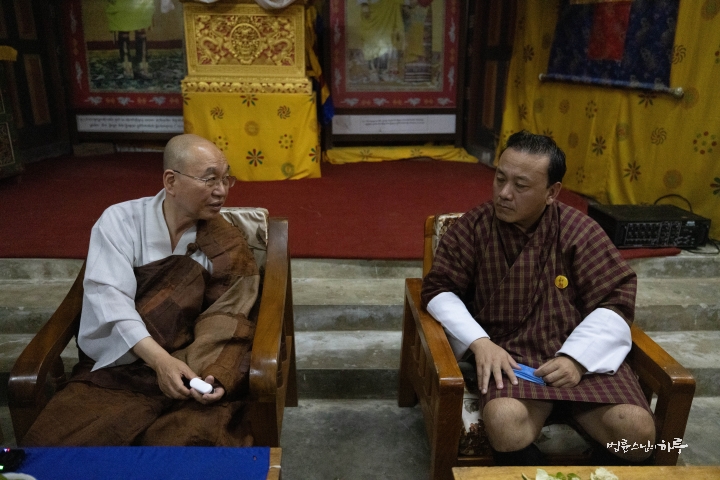
“I visited the Turkey-Syria border region last week. Last year, an earthquake caused all the buildings to collapse, and the area has experienced 10 years of war with many refugees. So we built a new school for 4,000 students, and I talked about having new hope, just as collapsed buildings are being rebuilt.
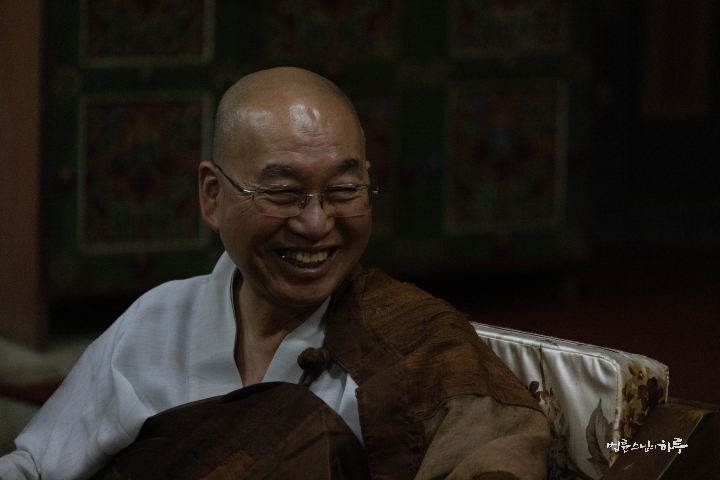
South Korea is now a developed country that people around the world envy, but in reality, tensions are so high that it wouldn’t be surprising if war broke out tomorrow. Outside of Korea, people ask with concern, ‘Isn’t war about to break out?’ But Koreans themselves have become insensitive to the danger because they’ve been in a state of temporary ceasefire for the past 75 years. In comparison, Bhutan is a country with a truly good environment. You should know that you’re living in a good country.” (Laughter)
“That’s right.”
As the conversation ended, Sunim expressed his gratitude to the Zhemgang governor.
“Thank you for agreeing to attend tomorrow’s completion ceremony despite your busy schedule.”
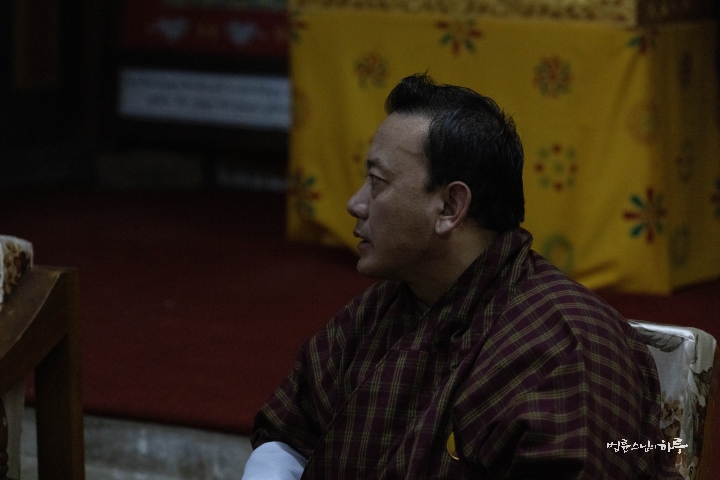
The Zhemgang governor also expressed his gratitude to Sunim.
“You’ve come from far away and are working hard, so I should gladly join you. I’m really busy too, but tomorrow is the day you complete the first project in Zhemgang with the residents, so I’m happy to be there.”
“It’s the first project in Zhemgang, so if you give some encouraging words to the residents, they will be more motivated.”
The Zhemgang governor offered to provide the Pangtang Eco-lodge hotel as accommodation for Sunim, but Sunim politely declined, saying he needed to personally stay at the lodging where the JTS volunteers were living. The governor also offered to host dinner, but Sunim declined and went to the temporary lodging where the JTS volunteers were staying to share the meal they had prepared.
After the meal, the house owner came with flowers and fruit to welcome Sunim. The owner greeted him in Korean, thanking him for visiting Bhutan.
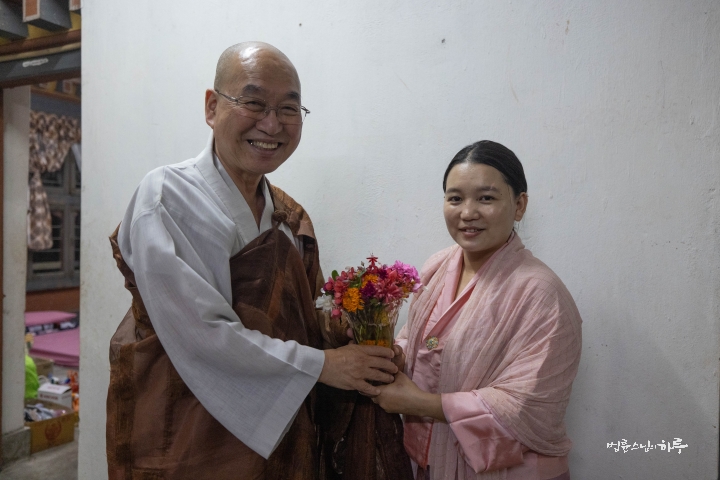
“Thank you.”
“Oh, you can speak Korean.”
“A little. I learned from watching Korean dramas.” (Laughter)
Sunim also gave socks and toothpaste he had brought from South Korea as gifts.
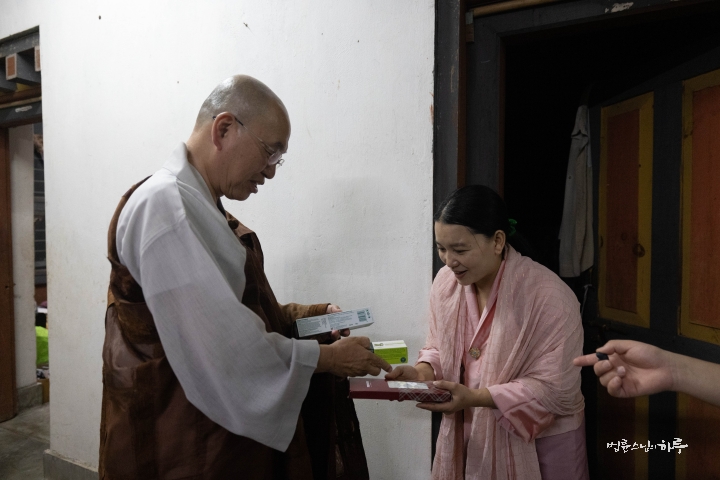
They sat around eating fruit and exchanging greetings with the house owner, concluding the day’s schedule.
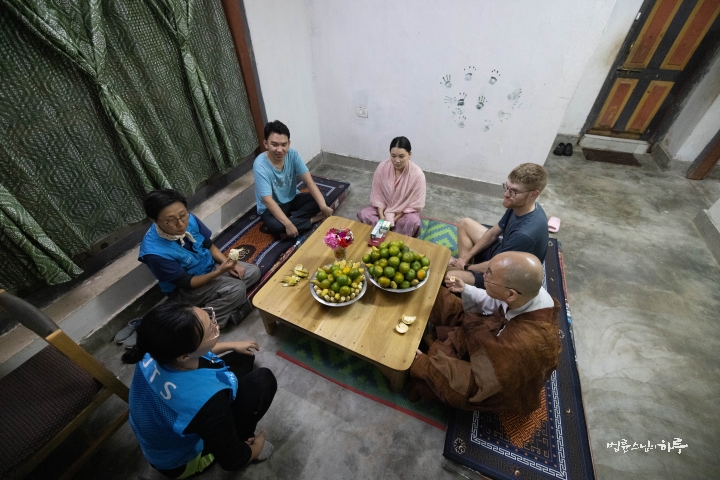
Since there was no Dharma talk today due to the all-day field investigation, I’ll introduce the content of a conversation between a questioner and Sunim from the live Dharma Q&A broadcast on the 25th.
Even When I Travel for a Few Days, Not a Single Friend Sends Me a Message
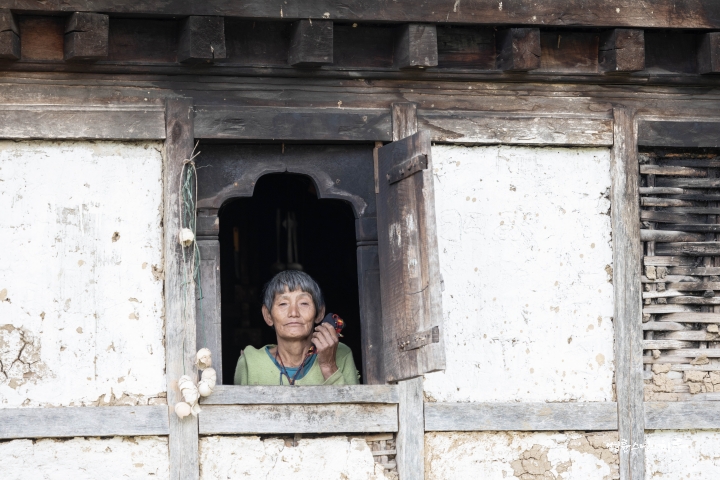
As we go through life, we find that we can’t share everything in our hearts even with our parents who gave birth to us, can we? No one can share everything with their parents who gave birth to and raised them, and even married couples can’t tell each other everything. It’s not just that you can’t share everything with your husband. All couples in the world feel disappointed that their spouses don’t fully understand them. So how can we easily find friends with whom we can share all the deep thoughts in our hearts?
The questioner has such high expectations for friendships that they always feel a lack of friends. Life is inherently a solitary journey – we come alone and leave alone. Also, we can’t share everything inside us with anyone. Of course, it would be nice to have someone with whom we could share everything. But in reality, it’s not that we can’t speak because we don’t have friends who understand us. It’s because we’re holding back that we can’t speak freely. If we didn’t hold onto ourselves, we could talk about anything to anyone.
The questioner keeps looking for someone who understands you, but why do you think others should understand you instead of you understanding others? Perhaps you’re suffering from a lack of affection because you didn’t receive enough love as a child. Thoughts like “I didn’t receive enough love from my parents” or “I didn’t receive love from my husband” keep arising because the questioner has a kind of mental illness.
“I’m grateful just to be alive when I open my eyes in the morning. I’m truly thankful just for not being dead. I’m really grateful just to be able to eat without starving. I’m thankful that I can see people when I open the front door and go out. I’m grateful that there are people who occasionally contact me by phone.”
If you think like this, the world becomes a livable place. There are practitioners who live alone deep in the mountains, befriending birds and nature. Such people don’t complain about not having friends even though they live alone. If I open my heart, I can live comfortably with nature as a companion even without people around. If I close my heart, I can feel lonely even sleeping back-to-back with my spouse. It’s a mistake to think that loneliness disappears only when someone is beside you. You feel lonely because you’re living with your heart closed. Instead of just looking for people while keeping your heart closed, try living with an open heart whether you’re reading books, meeting people, or taking a walk. If you keep feeling grateful for being alive, this kind of illness will disappear.
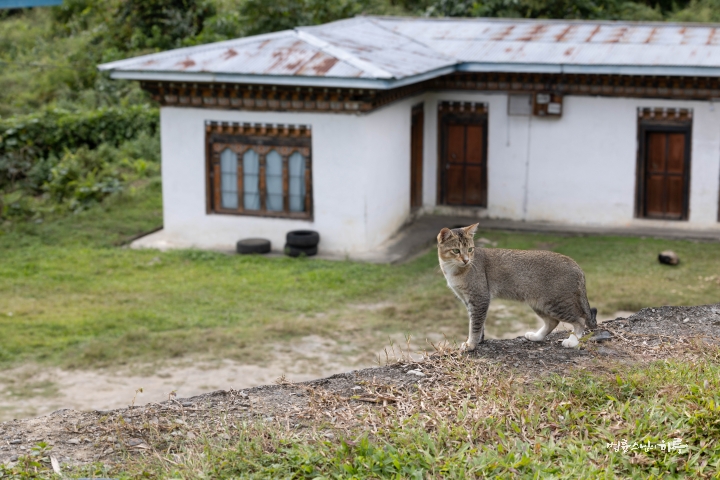
“I know someone who returns from a trip and finds 50 KakaoTalk messages on their phone. They have so many people around them. But when I come back from a week-long overseas trip, I don’t receive a single message. In the past, I had a friend whom I loved dearly, but after several decades, I realized they didn’t want me to get close, and our relationship ended. When I return from overseas or when I’m sick, I don’t receive any messages from anyone. I often wonder, ‘Why don’t people want to be close to me?'”
“Try setting some principles for yourself, like ‘I’ll always lend money to anyone who needs it’ or ‘I’ll buy a meal for anyone who calls me.’ If you go abroad for a week, you might come back to find over 100 calls from people asking to borrow money. You might also have over 100 calls from people asking you to buy them a meal. Most of the time, people contact others when they need something. No one contacts you if they don’t need anything. If people contact you frequently, it means they need you. If you don’t receive many calls, it means people don’t need you much.
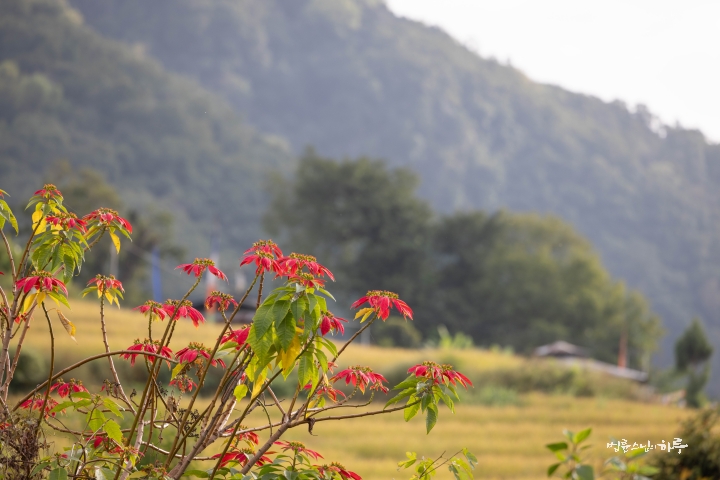
Why do people contact others? Why do many people seek out Sunim? They keep looking for me because they need something. Today, I received a call from a junior from school. The reason they contacted me was to ask for a recommendation for their new book. People always contact others because they need something. The reason you don’t receive calls is that you haven’t been needed for many things that people require.
However, receiving frequent calls isn’t necessarily a good thing. People often think, ‘Why do they only contact me when they need something?’ But that’s precisely what contact is for. Why would anyone contact you if they don’t need anything? So, not receiving calls means people don’t need you. Wouldn’t it be annoying if people contacted you too much? Therefore, be grateful when you receive calls, and when you don’t, appreciate the peace. Why feel disappointed when you don’t receive calls? It’s good because you don’t have any hassles. When you do receive calls, it’s good because someone needs you. I hope you can adopt this perspective.
If you’re curious why others receive many calls while you don’t, observe those people carefully. They probably often counsel others, lend money frequently, help people in need, or volunteer regularly. There’s surely a reason. If you start contributing more to what people need, you’ll receive more calls even as you age. Conversely, if you haven’t been very useful to people, you’ll receive fewer calls over time. So it’s better to think, ‘It’s actually good that I don’t receive many calls.’ If you want people to contact you more, start helping with whatever people need. Whether it’s volunteering or giving, if you increase such roles, you’ll receive more calls from people.”
“Yes, I understand.”
“Don’t crave contact from others too much, and don’t feel disappointed when you don’t receive calls. Life is ultimately solitary. When we die, we can’t take our spouse, children, or parents with us. That’s the nature of our lives. It’s very important to be able to stand alone in life.
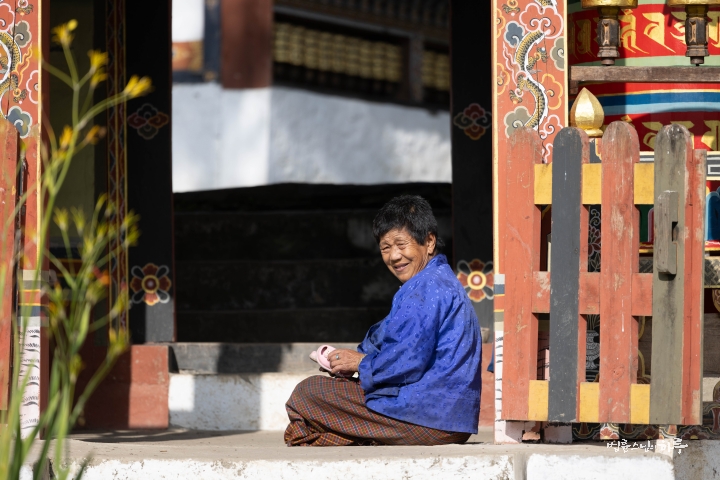
To avoid feeling lonely when you’re alone, meditation can be of great help. Meditation involves sitting quietly with your eyes closed, neither dozing off nor thinking, but simply being aware of your breath coming in and going out. It’s about maintaining a clear mind while not engaging in any relationships with anyone in the world, just staying in a quiet state by yourself. You can remain as still as a tree standing peacefully, so why should it matter if you don’t receive any KakaoTalk messages or phone calls? Therefore, I suggest you sign up for the weekend meditation program offered by Jungto Society and try to practice meditation consistently. In the summer, spend 4 nights and 5 days quietly meditating to calm your yearning mind. After a week of meditation, your craving mind will likely disappear.”
“Thank you.”
Tomorrow morning, Sunim will move to Goshing Gewog to attend the completion ceremony for the water supply project in Rimathang village, followed by the completion ceremony for the water supply project in Rebati village. In the afternoon, he will travel to Trongsa, and in the evening, he will have a meeting with the Trongsa governor.




